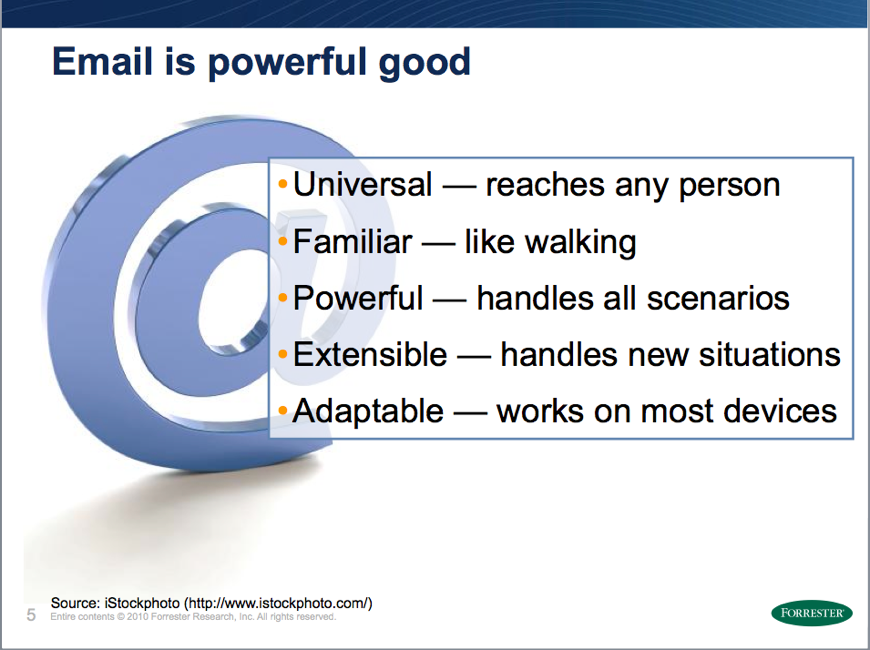Forrester: Email may be here to stay but it definitely needs an overhaul

Somewhere out there in the future is an online messaging, communications and collaboration nirvana - a place where I can work on documents with others, manage a conference call, check my schedule, conduct an IM chat and, yes, even manage email messages.
Until yesterday, I had always imagined the communications nirvana of the future as some sort of user interface that was free of the unruliness and ineffectiveness of email. But during a session at the Forrester IT Forum, I came to accept that email is here to stay.
Why? Forrester analyst Ted Schadler said it best: until there's something 10 times better and 10 times cheaper, there will be no reason to switch to something else. And so far, nothing else comes close. Email is universal, a powerful tool that's familiar, adaptable and powerful. Consider that, through email, you can instantly communicate with others no matter where they are on the planet, not to mention transmitting images, documents or any other digital file just by clicking send.
OK, so it's powerful - but it's also inefficient, unruly, cumbersome and in serious need of a complete overhaul. And that's just from the user's perspective. On the IT side of things, email is also a malware magnet, a drain on resources and a governance headache.
Email may be here to stay but the folks in the audience at the Forrester session had some visions of their own for managing email in the future. One guy suggested that, over time, an inbox might be able to learn from the user's interactions with messages. Some messages get deleted without being opened. Others are opened, read and replied to as soon as they arrive. Others are read hours or days later. If the inbox could "hold" emails that aren't important enough for immediate attention and provide a log of those that were kept out of the inbox at the end of the day, imagine how much more efficient the inbox might be.
Schadler talked about the efforts that are underway to tackle this e-mail issue - from add-ons such as Xobni or Gist to a modern-day update for Outlook and Notes, as well as complete rethinks such as IBM's Project Vulcan.
Of course, Schadler also brought up Google Wave - a conversation about re-inventing e-mail wouldn't be complete without it. Google's decision to release Wave as a platform, instead of a product, was both a curse and a blessing. On one hand, Wave generated a lot of instant interest but quickly fell off the radar because it was so confusing and incomplete. On the other hand, Wave has gone through some changes including the creation of some templates to show the sort of open-source flexibility it has when it comes to creating a true communications experience.
Wave has potential but it's missing one thing - and I can't believe I'm actually pointing it out. It doesn't integrate with email. And, now that I've come to realize that email is here to stay, I can also accept that my communications nirvana will need an element of email to it - a smarter form of email, hopefully.
What do you think? Is there life without email? Share your thoughts about what an email/communications nirvana might look like in the talkbacks.
Previous coverage: Forrester's IT Forum: Are today's CIOs reacting to or participating in business strategy discussions?
